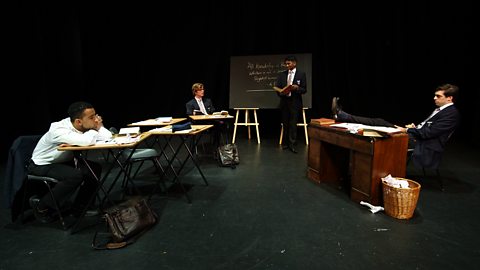HECTOR:I count examinations even for Oxford and Cambridge as the enemy of education.
NARRATOR:'What is education?'
MRS LINTOTT:History is women following behind with a bucket.
NARRATOR:'What is history?'
IRVIN:If you want to learn about Stalin, study Henry VIII.
NARRATOR:'What is a good teacher?
NARRATOR:'These are the themes of The History Boys.
NARRATOR:'At a boys school in northern England there are three teachers,
NARRATOR:'each embodying a different approach to education.3NARRATOR:'This is Mrs. Lintott, perhaps the most devoted teacher of the lot. For her, education is teaching the boys facts, without frills.'
MRS LINTOTT:They know their stuff. Plainly stated and properly organised, facts need no presentation.
NARRATOR:'A solid teacher but Mrs. Lintott is not inspirational enough for one ambitious headmaster.'
HEADMASTER:Education is more than just teaching the kids facts.
HEADMASTER:We need to teach them charm, polish, flare. Make them renaissance men.
NARRATOR:'Nor is Hector up to his standards.'
HEADMASTER:Hector's philosophy of education is old school. He's from an era when teaching was more physical. He hits the kids. He regards exams as the enemy of education.
HECTOR:I would call these lessons, a waste of time. Nothing that happens here has anything to do with getting on but remember, open quotation marks, "all knowledge is precious whether or not it serves the slightest human use."
SCRIPPS:Hector's got us learning all sorts of stuff off by heart.
SCRIPPS:Lots of it's arts based - Brief Encounter, The Seventh Veil, Gracie Fields.
SCRIPPS:It's his antidote to education. He calls it. "sheer calculated silliness."
HEADMASTER:Hector's approach is not curriculum driven enough for me.
HEADMASTER:Doesn't deliver predictable or quantifiable results.
HEADMASTER:That's why we need Irwin. A product of the 80s, Margaret Thatcher, quite happy to bend facts to get results.
IRVIN:Truth is no more at issue in an examination, than thirst at a wine tasting, or fashion at a striptease.
DAKIN:-Irwin is meretricious, showy and falsely attractive.
DAKIN:I really want to impress him.
IRVIN:-If you want to learn about Stalin, study Henry VIII. If you want to learn about Mrs. Thatcher, study Henry VIII.
SCRIPPS:It's this making it up I can't get used to. Arguing for effect, not believing what you're saying. That's not history, that's journalism.
NARRATOR:'Irwin's methods prevail, but despite the boys' Oxbridge success Hector feels the boys have a hole in their education. He finds them–'
HECTOR:-Magnificently unprepared for the long littleness of life.
NARRATOR:'This leads us on to our second theme.
NARRATOR:'What is a good teacher?'
HEADMASTER:Mrs. Lintott is excellent for A-level.
HEADMASTER:Gets great results.
NARRATOR:'Bennett shows that each of the three teachers, and their teaching styles has their pros–'
HEADMASTER:The boys are factually tip top, well taught, but beyond A-level, ordinaire.
NARRATOR:'and their cons. But then there's Hector, who does inspire with his general education but even he recognises he's jaded.'
HECTOR:-It ought to renew the young mind, warm, eager, trusting.
HECTOR:Instead comes a kind of coarsening. You start to clown.
HECTOR:Plus a fatigue that passes for philosophy but is nearer to indifference.
NARRATOR:-'Hector's teaching, although impressive, frustrates some.'
IRVIN:He teaches the boys all these, gobbets of extraordinary knowledge by heart, but then insists that they don't use it in exams.
IRVIN:So, what are they meant to be storing them up for, these boys. Education isn't something for when they're old and grey and sitting by the fire, it's for now. The exam is next month.
HECTOR:And what happens after the exam? Life goes on.
HECTOR:Gobbets.
NARRATOR:-'Then there's Irwin.'
SCRIPPS:He gets results doesn't he? We all got into Oxbridge but does that mean he's a good teacher?
SCRIPPS:Some of us see Irwin's approach as useless outside the examination room.
DAKIN:Why are you so bold in argument and talking but when it comes to the point, when it's something actually happening, I mean now, you're so f[BLEEP]ing careful.
NARRATOR:'So all three teachers are brilliant in their own way but as Mrs. Lintott explains, all are flawed.
MRS LINTOTT:One of the hardest things for boys to learn is that a teacher is human.
MRS LINTOTT:One of the hardest things for a teacher to learn is… not to try and tell them.
RUDGE:I think a lot of us, including the writer, Bennett, seem to think that a combination of the teachers might be best but me, I think we should combine Mrs. Lintott's rote learning with Irwin's original thought.
RUDGE:You've force fed us the facts now we're in the process of running around acquiring a flavour.
RUDGE:And the headmaster too,
RUDGE:he thinks it's best to employ Hector and Irwin in the same classroom.
HEADMASTER:-Share!
HEADMASTER:Your teaching, however effective it may or may not have been,
HEADMASTER:has always seemed to me to be… selfish.
HEADMASTER:Less about the interests of the boys than some cock-eyed notion you have about culture!
HEADMASTER:Sharing may correct that.
NARRATOR:'Even Irwin himself wishes his students would co-opt Hector's learning into their exam papers.'
IRVIN:The gobbets you have taught them, they tip the balance.
HEADMASTER:In the end all the combinations work.
HEADMASTER:All get good A-levels. All get into Oxbridge, and with the exception of Posner, all get good jobs. It's a remarkable achievement. Splendid news.
7500:05:47:22 00:05:52:07NARRATOR:'But in the end, Bennett professes sadness at the demise of Hector's approach.'
IRVIN:He was a good man
IRVIN:but I do not think there is time for his kind of teaching anymore.
SCRIPPS:No.
SCRIPPS:Love apart, it is the only education worth having.
HECTOR:Pass the parcel.
HECTOR:That's sometimes all you can do.
HECTOR:Take it.
HECTOR:Feel it.
HECTOR:Pass it on.
NARRATOR:-'Finally, what is the nature of history? Should history attempt to report the absolute truth of the past?'
IRVIN:I have just read 70 papers all saying the same thing and I am asleep.
SCRIPPS:But it's all true.
NARRATOR:'At least one teacher thinks not.'
IRVIN:What has that got to do with it? What has that got to do with anything?
MRS LINTOTT:There's no such thing as absolute truth.
MRS LINTOTT:Look at the denouement of our story - no one can say categorically what caused Hector to crash. It's all speculation. Not even the surviving victim can explain it.
IRVIN:I have no memory of the crash. I only know what I've been told.
NARRATOR: 'Alan Bennett himself, in press interviews, has said that he doubts the possibility of absolute truth.
MRS LINTOTT:There's plenty of anachronisms in our story, which shows Bennett's not particularly interested in historical accuracy for a start.
HECTOR:How can you teach the Holocaust?
NARRATOR:-'Beyond the question of historical truth, the characters find other reasons to question the purpose of historical study.'
HECTOR:-How can the boys scribble down an answer however well put, that doesn't demean the suffering involved? And putting it well, demeans it as much as putting it badly.
NARRATOR:-'Hector is all heart and finds most questions too emotive for schoolboy study.'
MRS LINTOTT:History's not such a frolic for women as it is for men. Why should it be? They never get round the conference table.
NARRATOR:'Whereas Mrs. Lintott's passion for the subject is tempered by her attitude to gender.'
MRS LINTOTT:History is women following behind… with the bucket.
NARRATOR:'Irwin is the only character to assign a positive role for history.'
IRVIN:History nowadays is not a matter of conviction, It's a performance. It's entertainment. And if it isn't, make it so.
NARRATOR:'And he certainly lives by his words, ending up performing history on TV.'
Key themes present in The History Boys by Alan Bennett are explored using a mixture of short dramatised sequences, narration and interviews with some of the key characters.
The key themes of The History Boys by Alan Bennett - education, history and good teaching - are examined through a mixture of dramatised sequences, narrative commentary and character interviews.
The narrator examines these themes as some key moments are played out.
The action sequences illustrate the themes by moving between significant moments and drawing out some of the key quotations that relate to each of the themes being explored.
This is from the series: Making a scene
Teacher Notes
Students could use this clip as part of their study of the play or as part of their revision work.
The ideas in the film could be used as part of initial work on an exploration of the themes, using the quotations and ideas as stimulus for their own presentation on one of the themes explored.
Curriculum Notes
This clip is relevant for teaching English Literature and Drama GCSE in England, Wales and Northern Ireland.
It also appears in OCR, Edexcel, AQA, WJEC and CCEA.
DNA - Plot. video
An overview of the plot of D.N.A .by Dennis Kelly.
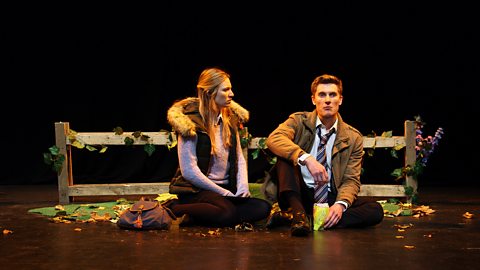
DNA - The Main Characters. video
An overview of some of the main characters in DNA by Dennis Kelly.
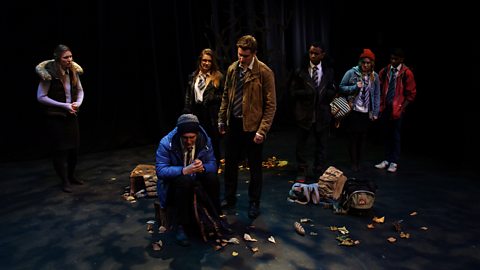
DNA - The Main Themes. video
An overview of some of the main themes in D.N.A. by Dennis Kelly.

Blood Brothers - Plot. video
An overview of the plot of Blood Brothers by Willy Russell.
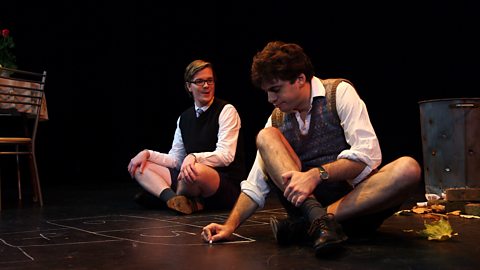
Blood Brothers - The Main Themes. video
An overview of some of the main themes in Blood Brothers by Willy Russell.
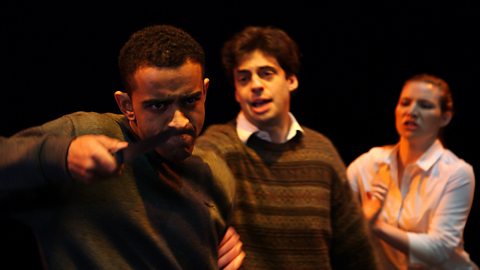
Blood Brothers - The Main Characters. video
An overview of some of the main characters in Blood Brothers by Willy Russell.
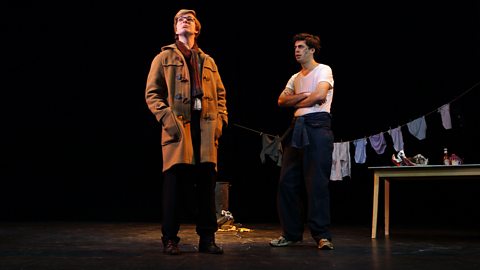
The History Boys - Plot. video
An overview of the plot of The History Boys by Alan Bennett.
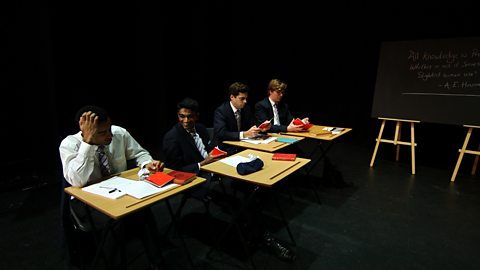
The History Boys - The Main Characters. video
An overview of some of the main characters in The History Boys by Alan Bennett.
